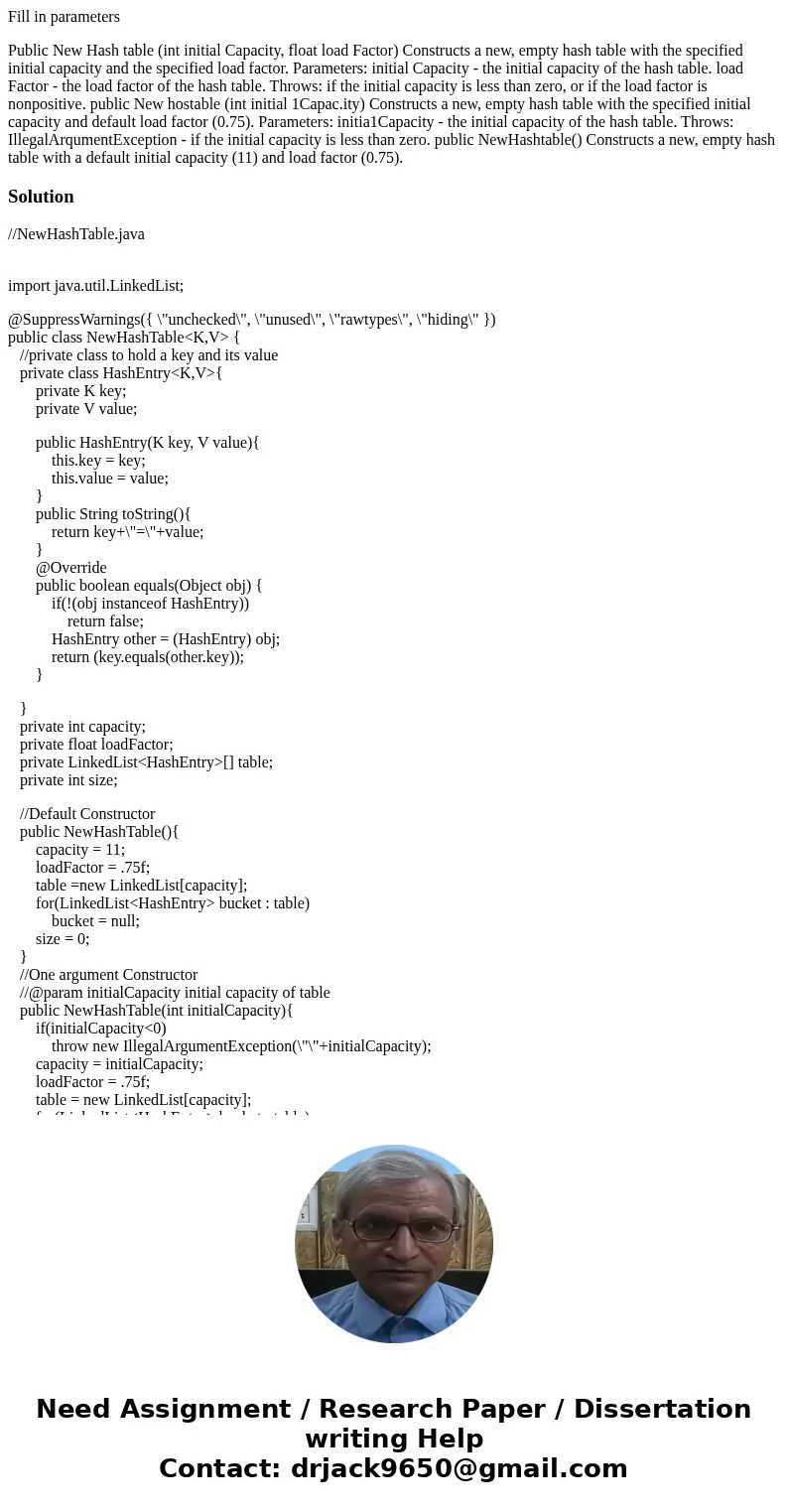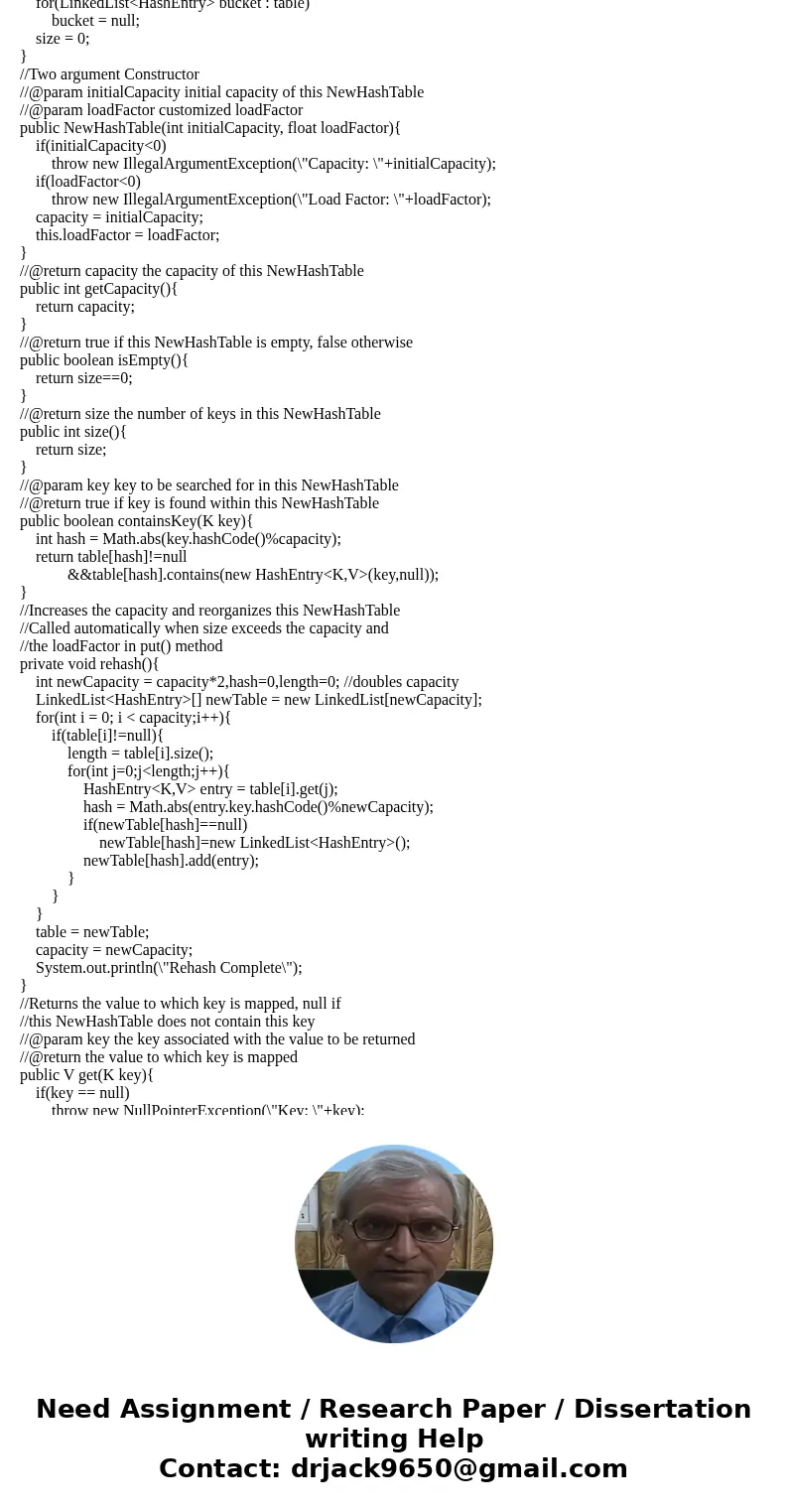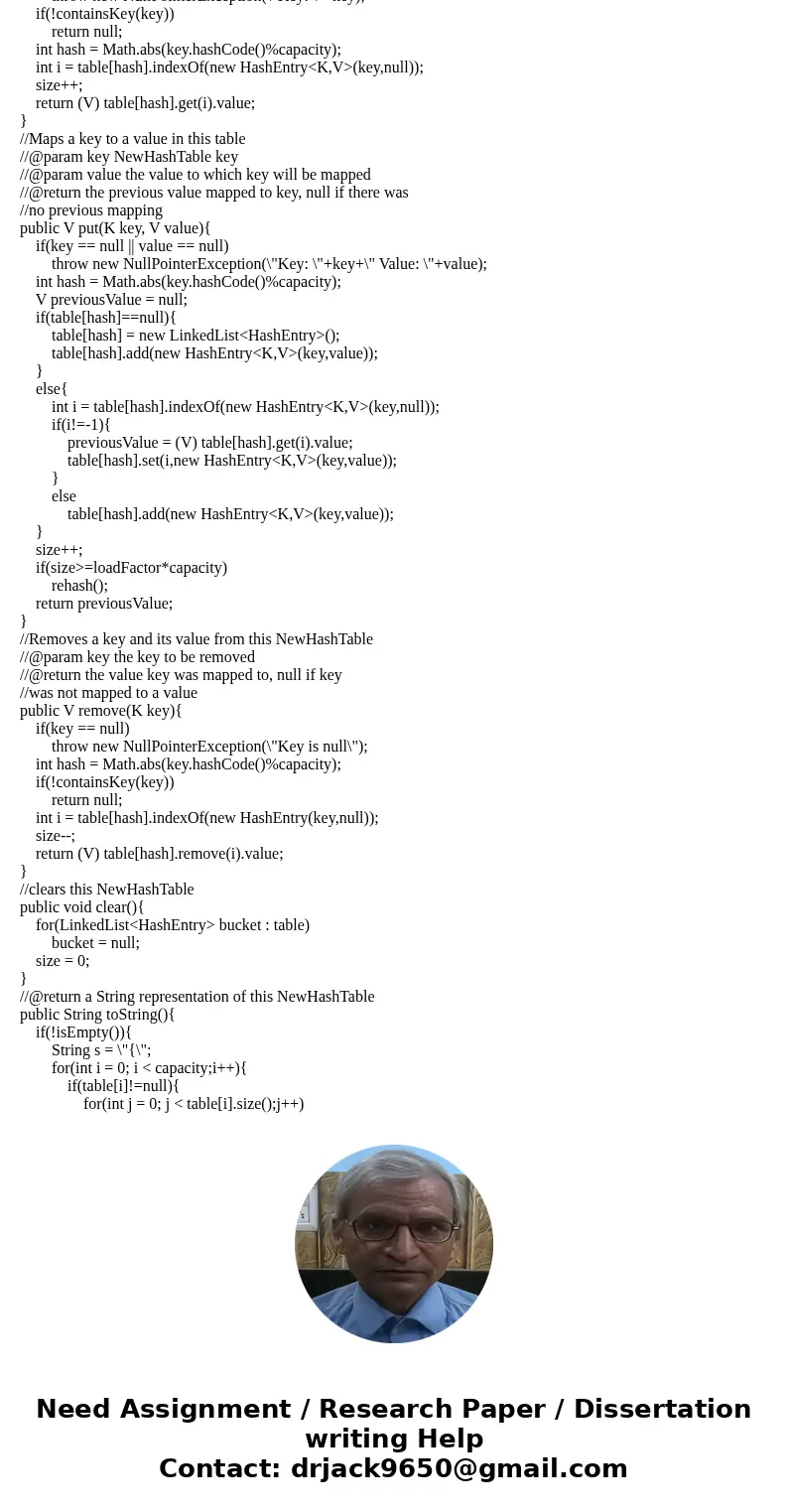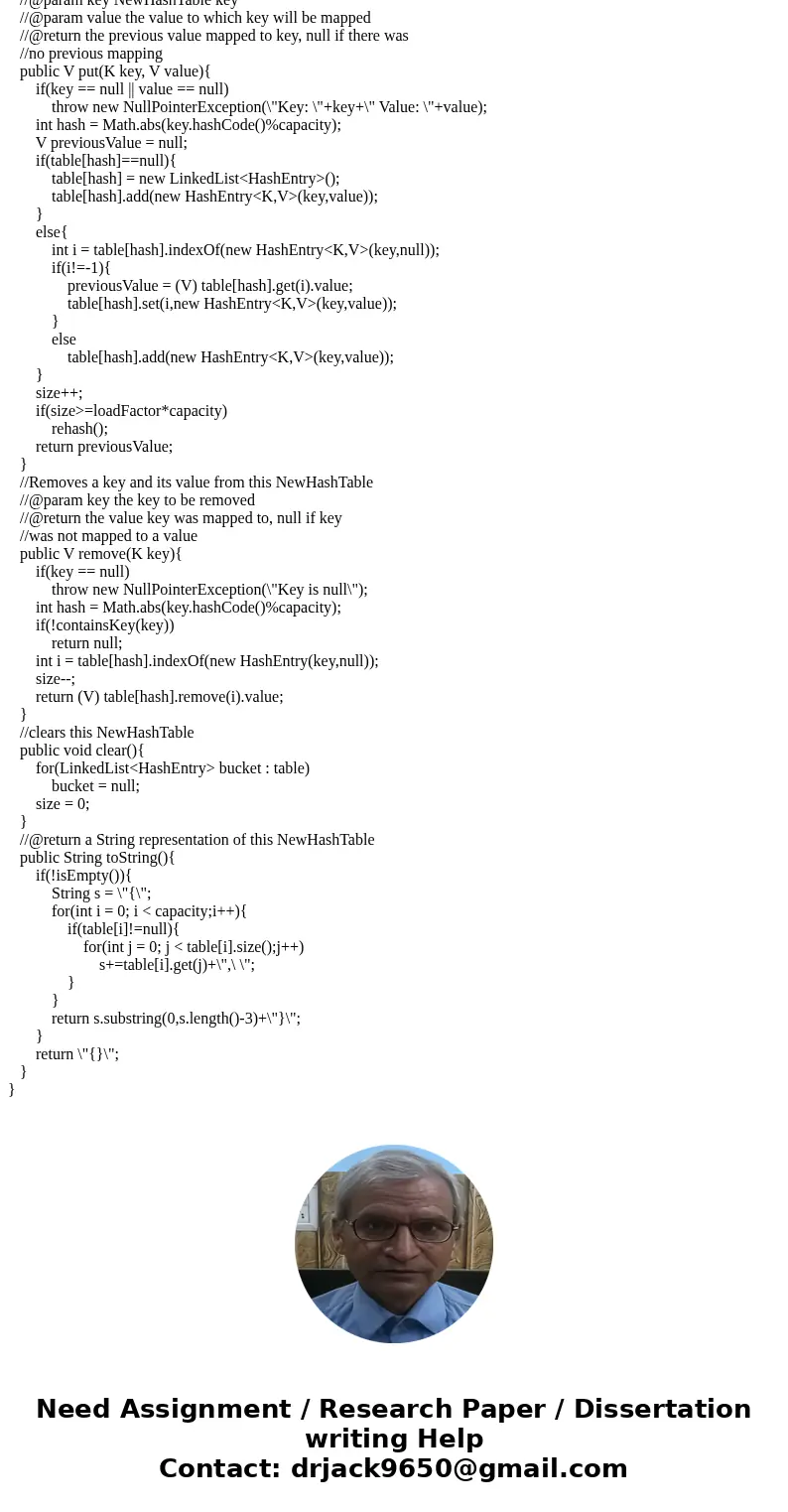Fill in parameters Public New Hash table int initial Capacit
Fill in parameters
Public New Hash table (int initial Capacity, float load Factor) Constructs a new, empty hash table with the specified initial capacity and the specified load factor. Parameters: initial Capacity - the initial capacity of the hash table. load Factor - the load factor of the hash table. Throws: if the initial capacity is less than zero, or if the load factor is nonpositive. public New hostable (int initial 1Capac.ity) Constructs a new, empty hash table with the specified initial capacity and default load factor (0.75). Parameters: initia1Capacity - the initial capacity of the hash table. Throws: IllegalArqumentException - if the initial capacity is less than zero. public NewHashtable() Constructs a new, empty hash table with a default initial capacity (11) and load factor (0.75).Solution
//NewHashTable.java
import java.util.LinkedList;
@SuppressWarnings({ \"unchecked\", \"unused\", \"rawtypes\", \"hiding\" })
public class NewHashTable<K,V> {
//private class to hold a key and its value
private class HashEntry<K,V>{
private K key;
private V value;
public HashEntry(K key, V value){
this.key = key;
this.value = value;
}
public String toString(){
return key+\"=\"+value;
}
@Override
public boolean equals(Object obj) {
if(!(obj instanceof HashEntry))
return false;
HashEntry other = (HashEntry) obj;
return (key.equals(other.key));
}
}
private int capacity;
private float loadFactor;
private LinkedList<HashEntry>[] table;
private int size;
//Default Constructor
public NewHashTable(){
capacity = 11;
loadFactor = .75f;
table =new LinkedList[capacity];
for(LinkedList<HashEntry> bucket : table)
bucket = null;
size = 0;
}
//One argument Constructor
//@param initialCapacity initial capacity of table
public NewHashTable(int initialCapacity){
if(initialCapacity<0)
throw new IllegalArgumentException(\"\"+initialCapacity);
capacity = initialCapacity;
loadFactor = .75f;
table = new LinkedList[capacity];
for(LinkedList<HashEntry> bucket : table)
bucket = null;
size = 0;
}
//Two argument Constructor
//@param initialCapacity initial capacity of this NewHashTable
//@param loadFactor customized loadFactor
public NewHashTable(int initialCapacity, float loadFactor){
if(initialCapacity<0)
throw new IllegalArgumentException(\"Capacity: \"+initialCapacity);
if(loadFactor<0)
throw new IllegalArgumentException(\"Load Factor: \"+loadFactor);
capacity = initialCapacity;
this.loadFactor = loadFactor;
}
//@return capacity the capacity of this NewHashTable
public int getCapacity(){
return capacity;
}
//@return true if this NewHashTable is empty, false otherwise
public boolean isEmpty(){
return size==0;
}
//@return size the number of keys in this NewHashTable
public int size(){
return size;
}
//@param key key to be searched for in this NewHashTable
//@return true if key is found within this NewHashTable
public boolean containsKey(K key){
int hash = Math.abs(key.hashCode()%capacity);
return table[hash]!=null
&&table[hash].contains(new HashEntry<K,V>(key,null));
}
//Increases the capacity and reorganizes this NewHashTable
//Called automatically when size exceeds the capacity and
//the loadFactor in put() method
private void rehash(){
int newCapacity = capacity*2,hash=0,length=0; //doubles capacity
LinkedList<HashEntry>[] newTable = new LinkedList[newCapacity];
for(int i = 0; i < capacity;i++){
if(table[i]!=null){
length = table[i].size();
for(int j=0;j<length;j++){
HashEntry<K,V> entry = table[i].get(j);
hash = Math.abs(entry.key.hashCode()%newCapacity);
if(newTable[hash]==null)
newTable[hash]=new LinkedList<HashEntry>();
newTable[hash].add(entry);
}
}
}
table = newTable;
capacity = newCapacity;
System.out.println(\"Rehash Complete\");
}
//Returns the value to which key is mapped, null if
//this NewHashTable does not contain this key
//@param key the key associated with the value to be returned
//@return the value to which key is mapped
public V get(K key){
if(key == null)
throw new NullPointerException(\"Key: \"+key);
if(!containsKey(key))
return null;
int hash = Math.abs(key.hashCode()%capacity);
int i = table[hash].indexOf(new HashEntry<K,V>(key,null));
size++;
return (V) table[hash].get(i).value;
}
//Maps a key to a value in this table
//@param key NewHashTable key
//@param value the value to which key will be mapped
//@return the previous value mapped to key, null if there was
//no previous mapping
public V put(K key, V value){
if(key == null || value == null)
throw new NullPointerException(\"Key: \"+key+\" Value: \"+value);
int hash = Math.abs(key.hashCode()%capacity);
V previousValue = null;
if(table[hash]==null){
table[hash] = new LinkedList<HashEntry>();
table[hash].add(new HashEntry<K,V>(key,value));
}
else{
int i = table[hash].indexOf(new HashEntry<K,V>(key,null));
if(i!=-1){
previousValue = (V) table[hash].get(i).value;
table[hash].set(i,new HashEntry<K,V>(key,value));
}
else
table[hash].add(new HashEntry<K,V>(key,value));
}
size++;
if(size>=loadFactor*capacity)
rehash();
return previousValue;
}
//Removes a key and its value from this NewHashTable
//@param key the key to be removed
//@return the value key was mapped to, null if key
//was not mapped to a value
public V remove(K key){
if(key == null)
throw new NullPointerException(\"Key is null\");
int hash = Math.abs(key.hashCode()%capacity);
if(!containsKey(key))
return null;
int i = table[hash].indexOf(new HashEntry(key,null));
size--;
return (V) table[hash].remove(i).value;
}
//clears this NewHashTable
public void clear(){
for(LinkedList<HashEntry> bucket : table)
bucket = null;
size = 0;
}
//@return a String representation of this NewHashTable
public String toString(){
if(!isEmpty()){
String s = \"{\";
for(int i = 0; i < capacity;i++){
if(table[i]!=null){
for(int j = 0; j < table[i].size();j++)
s+=table[i].get(j)+\",\ \";
}
}
return s.substring(0,s.length()-3)+\"}\";
}
return \"{}\";
}
}




 Homework Sourse
Homework Sourse